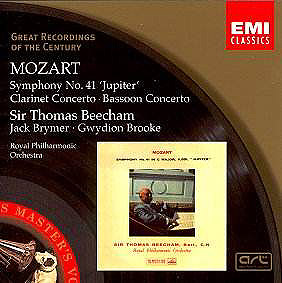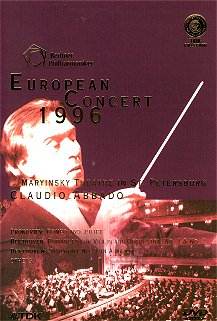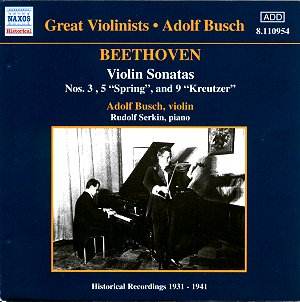 Composer: Wolfgang Amadeus Mozart
Composer: Wolfgang Amadeus Mozart
Works: Symphony No. 41 in C Major, K. 551 “Jupiter”; Clarinet Concerto in A Major, K. 622; Bassoon Concerto in B-flat Major, K. 191
Performers: Jack Brymer (clarinet), Gwydion Brooke (bassoon), Royal Philharmonic Orchestra, Sir Thomas Beecham (conductor)
Recording: Studio No.1, Abbey Road, London (Symphony – 26, 28/3/57 and Bassoon Concerto – 18/12/58); Salle Wagram, Paris (Clarinet Concerto – 14, 15/5/58)
Label: EMI
Mozart, a towering figure of the Classical era, encapsulated the essence of enlightenment ideals in his music, characterized by clarity, balance, and emotional depth. The works featured in this recording—his final symphony, the “Jupiter,” alongside the Clarinet and Bassoon Concertos—represent not only the culmination of Mozart’s compositional prowess but also showcase the unique interpretative talents of Sir Thomas Beecham and the Royal Philharmonic Orchestra. This compilation, part of EMI’s Great Recordings of the Century series, offers an opportunity to experience these masterpieces through a lens that balances historical context with performance vitality.
Jack Brymer’s interpretation of the Clarinet Concerto is particularly noteworthy, reflecting both the technical demands and lyrical beauty inherent in the piece. His phrasing is fluid and expressive, expertly navigating the concerto’s intricate passages while maintaining a conversational warmth that invites the listener into the heart of the music. The orchestral support, under Beecham’s direction, is equally commendable; the balance achieved between soloist and ensemble is nigh perfect, allowing the clarinet’s rich timbre to soar against the orchestral backdrop without overwhelming it. Beecham’s seasoned ear for orchestration is evident as he emphasizes the dialogue between the clarinet and the orchestra, particularly in the sublime Adagio, where the interplay of dynamics creates a palpable tension and release that is masterfully executed.
The Bassoon Concerto, composed in 1774, reveals Mozart’s early genius, and Gwydion Brooke’s performance captures its youthful exuberance with remarkable elegance. Here again, the collaboration with Beecham proves vital. The orchestral texture is lush, and the bassoon’s voice is rendered with a clarity and precision that brings out the work’s charming wit. The rhythmic vitality in the Allegro movement is particularly striking, with Beecham’s brisk tempo invigorating the ensemble and allowing Brooke’s technical prowess to shine through. This performance stands as a testament to Mozart’s ability to infuse character and nuance into even his earliest works, echoing through the ages with a freshness that still resonates today.
Beecham’s interpretation of the “Jupiter” Symphony is a thrilling exploration of Mozart’s final orchestral statement. His conducting style, often described as “Big Band Mozart,” lends a grandiosity to the work that some may find at odds with contemporary performance practices that favor period accuracy. However, Beecham’s deliberate pacing and emphasis on lyrical phrasing unveil details often overlooked in faster interpretations. The opening Allegro is imbued with a noble gravity, while the minuet’s stately tempo allows for a rich exploration of its sonorous textures. The fugal finale, with its intricate counterpoint, becomes a dazzling showcase of ensemble cohesion and individual virtuosity. Each phrase is articulated with care, allowing the listener to appreciate the architectural brilliance of Mozart’s writing.
The sound quality of this remastered recording is outstanding, particularly in capturing the warmth of the orchestra and the clarity of the soloists. EMI’s engineering provides a sonic landscape that complements Beecham’s interpretative choices, enhancing the listening experience without overshadowing the music itself. While some may seek the sharper edges of modern interpretations, this recording offers a lush, immersive experience—a sonic embrace that recalls the vibrancy of mid-20th-century orchestral sound.
The combination of Brymer’s lyrical artistry, Brooke’s vivaciousness, and Beecham’s expansive vision creates a compelling and richly textured listening experience. This disc not only preserves the spirit of Mozart’s music but also serves as a reminder of the interpretative possibilities that arise from a deep understanding of the score. For those who appreciate the interplay of historical context and performance artistry, this recording stands as a significant contribution to the canon of Mozart interpretations. It captures the exuberance and joy that are at the heart of Mozart’s music, ensuring its place in the pantheon of great recordings.



